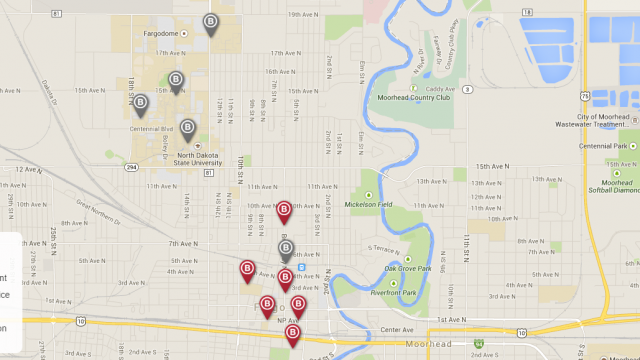Bike Socialism Coming Soon To Fargo

Bike share programs have a somewhat long and certainly embarrassing history in North Dakota’s two big university towns. In 2009, at the University of North Dakota, a bicycle sharing program consisting of 36 bicycles flopped after about a year. “[M]ost of the bikes were stolen, lost or ruined,” the Associated Press reported at the time. A similar program at North Dakota State University also flopped.
But now a new bike share program, with internet-connected hubs for pickups and drop-offs, is being launched in Fargo with no small amount of public and student money involved. The Great Rides Bike service is getting a $450,000 subsidy from NDSU student fees and at least $30,000 from the City of Fargo and hopes to be providing bike sharing starting this month, according to the Fargo Forum.
[mks_pullquote align=”right” width=”300″ size=”24″ bg_color=”#000000″ txt_color=”#ffffff”]Wouldn’t it make more sense to have your own bike, available to you at all times right at your home instead of access (for an annual fee) to a bike at some hub you have to walk to first?[/mks_pullquote]
Why the subsidies? The idea is to help NDSU students get from their main campus to the downtown campus several miles away. You can see a map of the on-campus and downtown bike share locations above.
The split campus, I should note, has long been a thorn in the side of students. It was created because everyone in Fargo gets super drippy about locating everything in their downtown area, but it’s a real pain for students who have to figure out how to get to classes off their main campus. Especially when the frigid weather North Dakota is famous for makes things like biking and walking impractical (the parking situation in downtown Fargo is atrocious).
Go figure. Another instance where something trivial like aesthetics takes priority over efficiently serving students.
But let’s back to the bikes. Students get access because their fees are being used to subsidize the company. Non-students must pay $75 per year. Fargo taxpayers, who are also subsidizing the program, don’t get any such benefit.
The idea of a bike sharing program run as a private enterprise might make some sense, but the fact that this company is already relying on city/student subsidies speaks volumes. For the casual biker, you can pick up your own bicycle at Walmart or Target for about the price of an annual membership with this company. Wouldn’t it make more sense to have your own bike, available to you at all times right at your home instead of access (for an annual fee) to a bike at some hub you have to walk to first?
Assuming there’s a bike left for you to take?
And why would regular bikers want to rent a bike? They’re likely to have shelled out for a higher-quality bike than the sort they can get through a sharing program.
If this program were worth the student fees and tax dollars being spent on it – that is to say, if there is really sufficient demand for bike sharing that’s going to make this program worth it – then it could probably be run as a business based on voluntary purchases of memberships. That it needs the subsidy of tax dollars and student fees tells me this isn’t something that’s really in demand.
Update: Originally the inartful way I worded the paragraph about the finances behind this program was misleading. The program is not getting $450,000 from students. It is getting $450,000 in sponsorships and subsidies including money from student fees and the City of Fargo. I’ve re-worded that paragraph to make it more clear. Also, below is the presentation NDSU students got selling them on the program. You can read the minutes from that meeting here.




